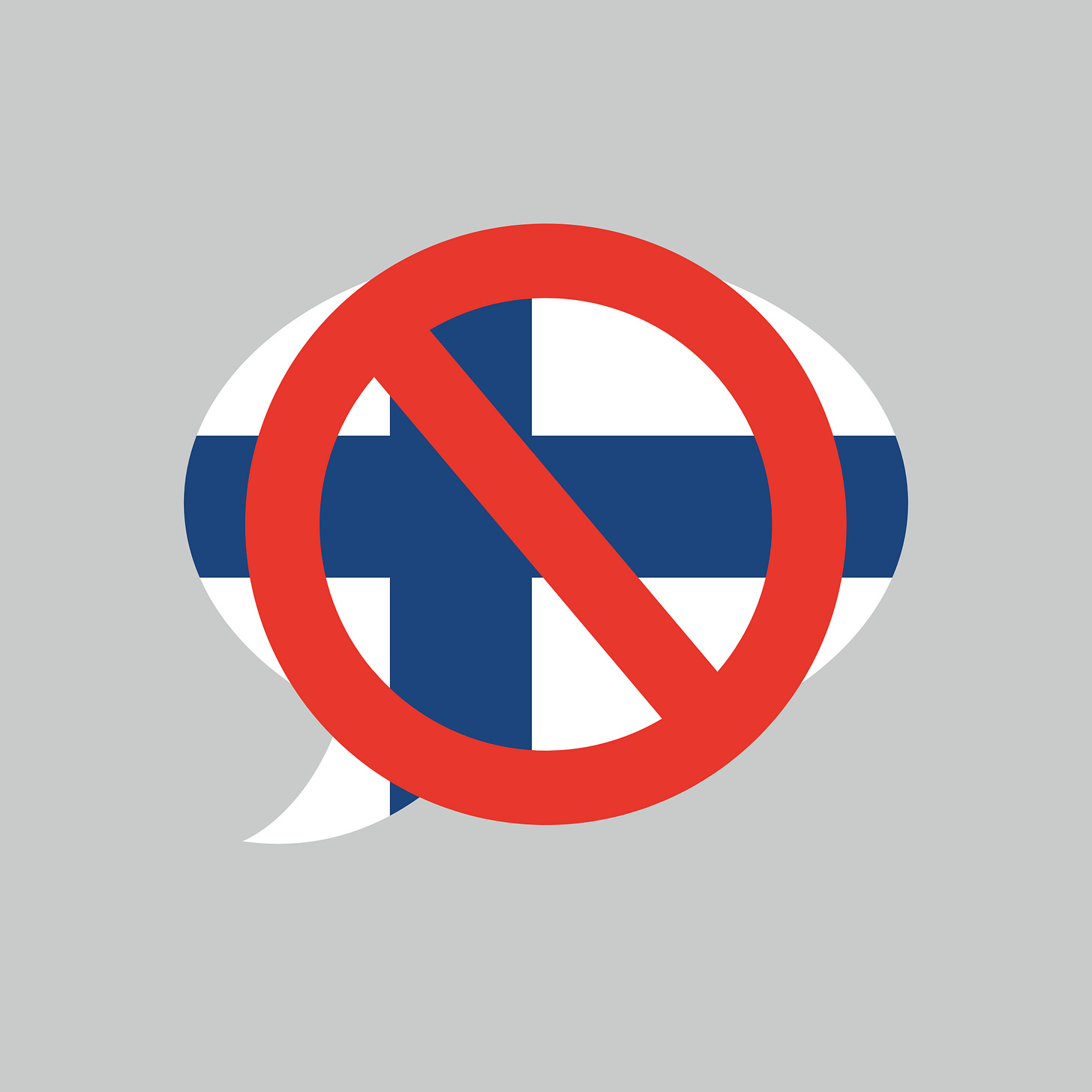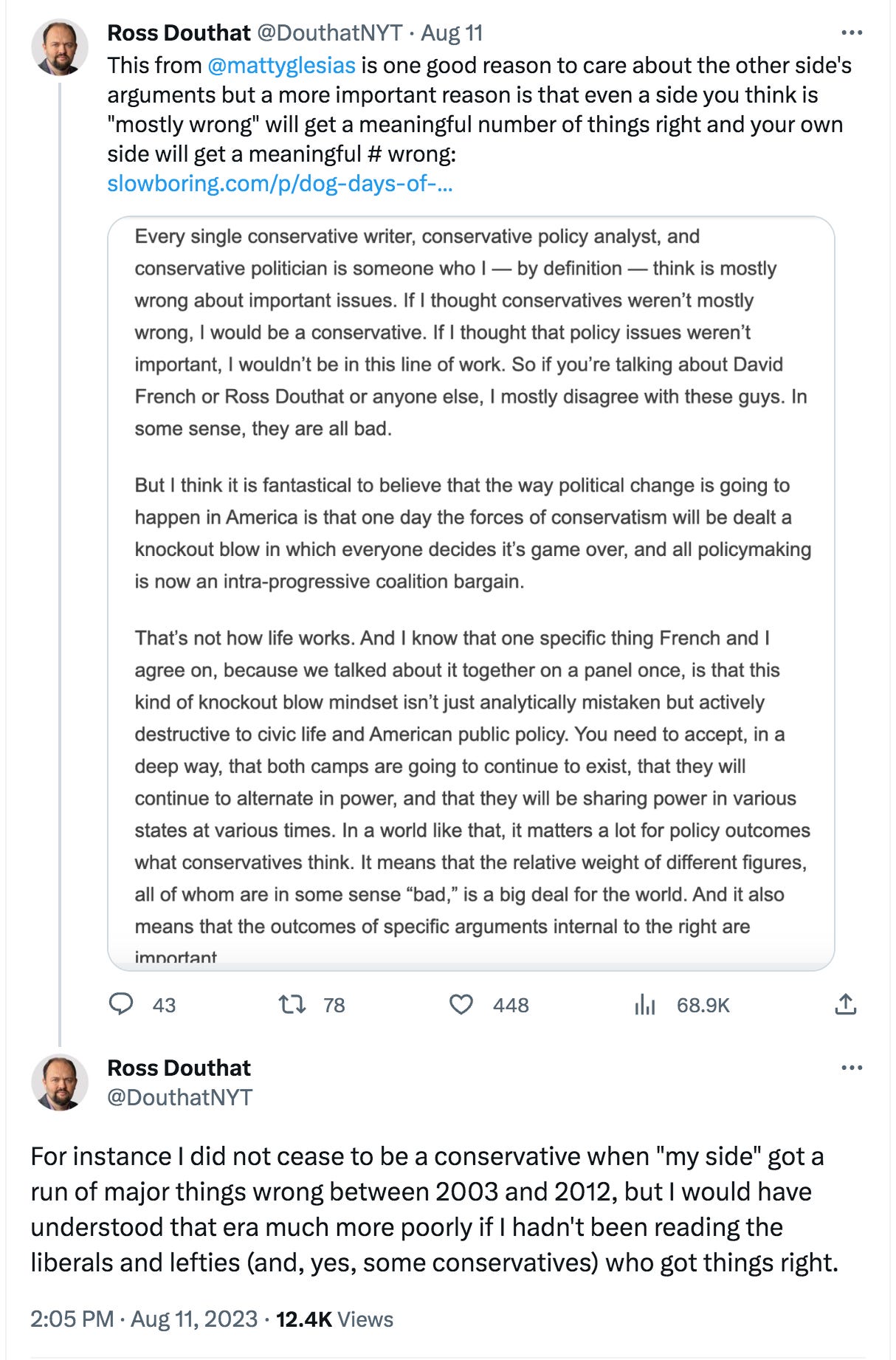E-Pluribus | August 14, 2023
Something rotten in Finland; sometimes it really *is* for the children; the wrong stuff on the right.
A round-up of the latest and best writing and musings on the rise of illiberalism in the public discourse:
Kristen Waggoner: Finland Puts Free Speech on Trial
Yes, Denmark usually gets the rap for having something rotten in it, thanks to Shakespeare, but surely the bard would detect a foul odor from this case drifting across the Baltic Sea. Kristen Waggoner reports at National Review on an amazing and appalling situation in Finland.
Päivi [Räsänen]’s case began in 2019 when her church decided to sponsor a local Pride parade. As a Christian and a pastor’s wife, Päivi disagreed with that decision. So she openly questioned it on Twitter, and she included a Bible passage for reference. What came next reads like something out of the Inquisition: She faced a 13-hour police interrogation followed by a government investigation into her past public statements. Investigators dug up a 2004 church pamphlet she had authored on marriage and sexuality, as well as comments on a 2019 radio show. For those statements, Päivi was charged with three counts of “agitation against a minority group” — and a Lutheran bishop, Juhana Pohjola, was charged for publishing her pamphlet.
In the courtroom, it became clear that the state prosecutor’s issue wasn’t so much with Päivi as with the Bible itself. She proceeded to examine Päivi and the bishop over their theological views. She asked about the relationship between the Old and New Testaments, why some texts are interpreted literally, and whether religious beliefs can change. More than once, the judge interrupted to ask why those questions were relevant.
Päivi and the bishop were eventually acquitted, with ADF International supporting their legal defense. In a unanimous decision, the court declared what should be obvious to all: “It is not for the district court to interpret biblical concepts.” But the state prosecutor, bent on making an example of Päivi, appealed the decision. A new trial is set to begin on August 31.
It’s hard to believe that a modern Western democracy is actively prosecuting someone for mere speech. Unfortunately, this is not an isolated case. It is part of a much broader trend of growing government censorship around the world. In recent years, non-Western countries have seen an uptick in “blasphemy” laws, making it illegal to speak views that could be perceived as blasphemous to a particular religion. This same principle is now at work in the West through so-called “hate speech” laws, which silence and punish those who disagree with the government’s ideology. This new version of censorship now blankets Europe, Canada, Australia, and New Zealand, placing a chilling effect on speech. America is one of the last nations still resisting this trend — but the more it spreads, the greater the pressures will be to enact censorship here.
Read it all.
Jonah Goldberg: In Defense of Onerousness
Ease of access to vast amounts of information has revolutionized our society in many good ways, but every silver lining has a cloud. Writing in his G-File column at The Dispatch, Jonah Goldberg says that sometimes there are good reasons for barriers, and shielding children from today’s ubiquitous pornography is certainly one of them.
We come into this world as little barbarians. And it’s the work of society, but especially parents, to civilize kids. Frequent exposure to pornography is not helpful to that project. Over at Cato, Jennifer Huddleston runs through many of the problems with age verification regulations, for both pornography and social media generally. Again, some of her arguments are entirely valid and I think the barracudas should deal with them as best they can. But she concludes: “Because the issues with each child and family are different, there is unlikely to be a regulatory regime that can satisfy the difficult and nuanced challenges faced by parents in a digital age. Importantly, policymakers and parents should engage with young people to fully understand their changing online behaviors and experiences. The best solution is to empower and educate parents and young people to make responsible choices with technology. Such an approach can allow for individuals to more directly address the concerns associated with harmful social media usage while allowing the next generation to experience the benefits of positive social media use. If policymakers feel they must do something about these concerns, they should consider less‐restrictive solutions that focus on education and empowerment of young people and parents rather than onerous regulatory regimes.”
Yes, by all means consider other solutions. But come on. This is basically saying, “You’re on your own parents.” And it is precisely this approach that invited these laws in the first place. Of course, parents should parent their kids. But in the pre-internet age, no one would ever say, “Kids should be allowed to go to strip clubs and porn theaters. It’s up to parents to ‘engage’ with their 14-year-old boys and explain to them why they shouldn’t go to those places.” I don’t even understand how “empowering” kids is an argument for limiting their consumption of porn.
Everything is improved when good parents parent goodly. But the state has both the interest and the ability to make it just a little easier for good parents to raise good kids, and even more of an interest in making it a little more difficult for bad parents to raise bad kids. Imagine saying, “The best solution is to empower and educate parents and young people to make responsible choices with technology,” about handguns, drugs, cars, or cosmetic surgery. Those are all forms of “technology,” too, and we have all sorts of rules that make it easier for parents to tell their kids they can’t have a Glock, a dime bag of heroin (or a Viagra prescription), breast implants, etc.
Read it all here.
David French: The Lost Boys of the American Right
David French has written frequently about the dark side of conservatism. In his latest New York Times column, French zeroes in on the pressures and temptations young men on the right face (including self-imposed pressure, to be sure) when trying to defend their ideological positions.
As I survey the right — especially the young, so-called new right — I see a movement in the grip of some rather simple but powerful cultural forces. Hatred, combined with masculine insecurity and cowardice, is herding young right-wing men into outright bigotry and prejudice. Contrary to their self-conception, they’re not strong or tough or courageous. They’re timid sheep in wolves’ clothing, moving exactly where the loudest and most aggressive voices tell them to.
To understand the cultural dynamic, I want to introduce you to an obscure online concept, no enemies to the right. A tiny fringe adopts this mind-set as a conscious ethos, but for a much larger group, it is simply their cultural reality. In their minds, the left is so evil — and represents such an existential threat — that any accommodation of it (or any criticism of the right) undermines the forces of light in their great battle against the forces of darkness. Attack the left in the most searing terms, and you’ll enjoy the thunderous applause of your peers. Criticize the new right, and you can experience a vicious backlash. The result is a relentless pull to the extremes.
In fact, one of their prime reproofs of what they might call the zombie right, the Reagan right of their parents’ generation, is that it was simply too accommodating. As they see it, classical liberal politics, which preserve free speech and robust debate as a priority, emboldened and empowered the left. Compromise, in their view, ran only one way, and conservatism conserved nothing. The left, in their mind, is winning the culture war in a rout.
[ . . . ]
[E]ven when one initially embraces bigotry “only” as a form of social transgression, marinating in that environment soon turns trolling into conviction. In contrite comments to The Washington Free Beacon in response to additional revelations from his private messages, Gonzalez said, “What starts off as joking can very quickly become unironically internalized as an actual belief.”
How true, especially when dissent is constantly characterized as weakness or cowardice. So in the name of strength, these young men capitulate until their minds and hearts are warped beyond recognition.
It’s difficult to break the hold of bigotry and fury on the online right, but as is so often the case, the solution to online evil can be found in offline relationships, the family and friends who keep us grounded to the real. Indeed, in his mea culpa, Gonzalez credits “fatherhood and learning to live for my kids” with pulling him back from his darkest thoughts. Time will tell whether he has truly changed or if he’s experiencing the fake sorrow of the freshly shamed, but it remains true that encountering people in full, rather than as mere online avatars for hated ideas, can indeed soften hearts and change minds.
Read the whole thing.
Around Twitter
Via Pamela Paresky and Jacob Mchangama, it’s been a year since Salman Rushdie was attacked at the Chautauqua Amphitheater in New York:
Ross Douthat references a Matt Yglesias piece to make a point about learning from the “other side”:
And finally, a sad reminder of how far (in the wrong direction) Hong Kong has come:











